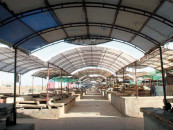The prerequisites of democracy
Education levels out extremist ideology, which in Pakistan’s case threatens its very sovereignty and existence

The prerequisites of democracy
Admittedly, with one successful term of democracy behind us and being in the midst of the second, we still wait for the prosperity — economic, social and political — that Western democracies exhibit and enjoy. The notion of equality of opportunity, life quality, life expectancy and exercise of free will for all citizens seems like a utopian notion which is becoming more elusive with each passing day. Pakistan’s democracy is the best example of Platonian tyranny of the masses and the only antidote to this dilemma is education.
The need of the hour is to increase investment in education which will have long-term benefits in legitimising and strengthening democracy in Pakistan. Education proliferation will enable the common man to develop the maturity required to sustain and develop democracy as a dependable political system in Pakistan.
An educated person understands the need for norms of tolerance; education can restrain a person from adhering to extremist doctrines and increases one’s capacity to make rational electoral choices.
The evidence on the contribution of education to democracy is even more direct and strong on the level of individual behaviour within countries, than it is in cross-national correlations. Education levels out extremist ideology, which in Pakistan’s case threatens its very sovereignty and existence.
The government’s lack of interest in education can be explained by John K Galbraith’s concept of the culture of contentment. The culture of contentment can be explained as the rich believing that the satisfaction of their interests creates contentment for all, like a bubble of happiness that only surrounds them. This culture encourages government spending in expenditure favourable to the fortunate, such as financial rescue, military spending, and of course, interest payments. The reality is that it only leads to disproportionate development.
This results in imbalances which become circular and accelerate social, political and economic disorganisation.
The government needs to address the education famine that Pakistan is experiencing for the sake of its own stability and maintenance of its ‘contentment’. A society divided between the impoverished masses and a small, favoured elite, results either in an oligarchy or a tyranny. By no means does it lead to a functional democracy.
Published in The Express Tribune, February 29th, 2016.



















COMMENTS
Comments are moderated and generally will be posted if they are on-topic and not abusive.
For more information, please see our Comments FAQ